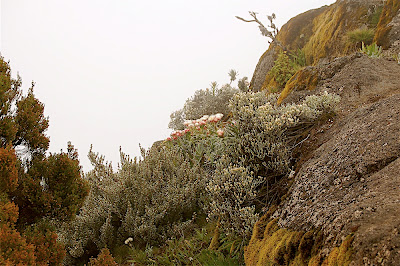 |
| Reginald's Tower |
Reginald’s Tower was once described by the famous Irish patriot Thomas Francis Meagher in 1843 as being “
a massive hinge of stone connecting the two great outspread wings, the Quay and the Mall within which lay the body of the city", Reginald's Tower is one of the finest surviving examples of medieval urban defence in Ireland.
The story of Reginald's Tower begins with the Viking adventurer Regnall who constructed a defensive base [known as a Longphort] where the tower stands today. Regnall was the grandson of the feared Ivor the Boneless, and by establishing his longphort at Waterford he created the foundations for Ireland’s first city. It quickly developed into an important trading hub, and Waterford become a vital part in an expansive trading network that connected it to far flung and exotic places like Baghdad, Greenland, Russia and Byzantium.
 |
| Access to each level is via the spiral staircase |
Waterford grew in wealth and prestige, and gradually the Viking raiders became entwined with the Gaelic Irish population through alliances and marriage, forming a culture known to historians and archaeologists today as the Hiberno-Norse. The peace of Waterford was not to last though, the city was taken following a siege by the Anglo-Normans in 1170 after many of the Waterford men were slaughtered after falling into Raymond le Gros’s cunning trap at nearby Baginbun in County Wexford (
click here for that story). The Normans held the leaders of the city in Reginald’s Tower, but released them following an intervention by their Irish ally, Diarmaid MacMurrough, King of Leinster. The leader of the Normans, Richard de Clare (known as Strongbow) married King Diarmaid’s daughter Aoife in Christchurch Cathedral in Waterford, strengthening the alliance between the Norman invaders and the Irish kingdom of Leinster.
 |
| The elaborate roof of the Tower |
The Hiberno-Norse warriors that survived were expelled from Waterford, but rose in a bloody rebellion in 1174, forcing the Norman nobles and garrison to take shelter in Reginald’s Tower, where they managed to repel the attack and following reinforcement they took back the city. King Henry II in England had began to worry that Strongbow was becoming altogether too powerful and big for his boots, so he sailed into Waterford in 1171 and declared the wealthy Waterford to be a ‘Royal City’, thus denying its lucrative trade to Strongbow. King Henry had the city refortified in the early thirteenth century, and it is likely that it was at this time that the wooden fort of Reginald’s Tower was reconstructed in stone. He had large stone walls constructed to surround and protect the city with a number of defensive gateways and towers added. Very little of these walls still survive today, and of the seventeen defensive towers that once protected Waterford only six still survive, with Reginald’s Tower being the most impressive and best preserved.
Reginald’s Tower was again at the centre of the action in 1495, Perkin Warbeck a pretender to the English Crown, sailed up the River Suir and began to bombard Waterford to force it to surrender. The people of Waterford retaliated by firing cannon from Reginald’s Tower and succeeded in sinking one of Warbeck’s ships, defending the city with such ferocity that Warbeck retreated. In recognition of the determined bravery by the people of Waterford, King Henry VII gave Waterford the motto: '
Urbs Intacta Manet Waterfordia' – Waterford remains the Untaken City.
However the Tower is not without its scars, and if you look high on the tower to the right hand side of the entrance you can see a cannonball deeply embedded into the stone. This was fired during the Parliamentary siege in 1650.
 |
| Cannonball embedded in the walls of Reginald's Tower |
They had returned to capture Waterford after Cromwell had failed to do so in 1649, Waterford was the last Irish city east of the Shannon to fall to Cromwell’s forces.
Today visiting Reginald’s Tower you can become steeped in all of this history, and see the variety of ways that Reginald’s Tower has served Waterford over the centuries, from being a defensive bastion, a coin mint, an armoury and arsenal, a prison and the home of the High Constable of the city.
It is split over four floors connected by a medieval style spiral staircase, with displays on different aspects of the buildings history on each level. There are some really interesting artefacts on display, as a dog owner I was touched by the beautifully intricate copper-alloy dog collar dating all the way back to the twelfth century.
 |
| The 12th Century copper-alloy dog collar |

Reginald’s Tower is a truly iconic landmark of Waterford, and today the superb museum is certainly worth a visit! It is under the auspices of the Office of Public Works, you can find information about opening hours, entry fees and accessibility here
http://www.heritageireland.ie/en/South-East/ReginaldsTower/. It is one of remarkable Waterford Treasures, along with the Medieval Museum and Georgian Museum that make Waterford such a wonderfully historic and fun city to visit. You can find more information on the Waterford Treasures here
http://www.waterfordtreasures.com/.
I really hope you enjoy our blog posts. If you’d like to consider supporting us you can do so by downloading one of our audioguides. They are narrated by professional actors, and have original music by talented musician
Enda Seery to help immerse you in the story. They generally run for around 45mins and can be downloaded from our website at
www.abartaaudioguides.com. A number are available free of charge and others cost just €1.99, so if you’d like to hear the story of
Glendalough, or what life in
Dublin was like when it was a Viking Longphort please do try our guides.
If you’d like to keep up with daily posts about Irish heritage then you can find us on
Facebook,
Twitter and
Google+. If you have any suggestions about great sites to visit I'd love to hear from you, please leave a comment below or you can email us at
info@abartaaudioguides.com.

























